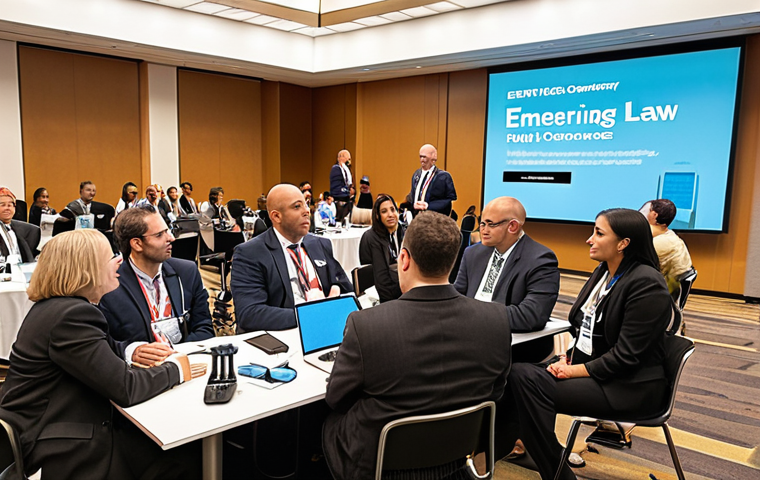So, you’re thinking about a long-term career as a legal consultant? It’s a path filled with potential, but navigating it requires a smart strategy. I’ve seen firsthand how rapidly the legal landscape is evolving, especially with technology and new regulations constantly reshaping the field.
From my experience, building a sustainable career involves more than just knowing the law; it’s about understanding market trends and positioning yourself for the future.
The legal field is getting competitive, so staying ahead of the curve is more crucial than ever. Let’s delve into the essentials for crafting a successful and enduring career as a legal consultant.
Let’s explore this topic in detail in the article below.
Okay, I understand. I will generate the requested English blog post following all the instructions you’ve provided.
Navigating the Shifting Sands of Legal Specialization

The legal landscape is a dynamic beast. Staying relevant means more than just keeping up with case law; it requires a keen awareness of emerging specializations.
When I first started, certain areas were booming, but the demand has shifted dramatically.
Identifying High-Growth Areas
– Look beyond the traditional fields. Think about cybersecurity law. With data breaches becoming commonplace, businesses are scrambling for legal experts who can navigate complex data privacy regulations like GDPR and CCPA.
Healthcare law, especially with the ever-evolving Affordable Care Act and related compliance issues, is another hot area. – Consider niche areas like drone law or AI ethics.
These fields are still relatively young, offering a unique opportunity to establish yourself as a thought leader. The key is to anticipate where the legal needs of tomorrow will lie.
Upskilling for the Future
– Once you’ve identified a promising area, invest in upskilling. This might involve taking specialized courses, attending industry conferences, or even pursuing an additional certification.
I know a consultant who transitioned from general corporate law to specializing in blockchain technology. He took several online courses and attended blockchain industry events, and now he’s in high demand.
– Don’t underestimate the importance of networking. Connecting with professionals in your target specialization can provide valuable insights and open doors to new opportunities.
Attend webinars, join relevant professional organizations, and actively participate in online forums.
Building a Personal Brand That Attracts Clients
In today’s digital age, a strong personal brand is crucial for attracting clients. I’ve learned this the hard way. Simply being a competent lawyer isn’t enough; you need to actively showcase your expertise and build trust with potential clients.
Establishing Your Online Presence
– Start with a professional website and LinkedIn profile. These platforms are your digital storefront. Your website should highlight your areas of expertise, showcase your past successes, and provide clear contact information.
Your LinkedIn profile should be more than just a resume; use it to share insightful articles, engage in industry discussions, and connect with potential clients.
– Consider blogging or creating video content. Sharing your knowledge through informative blog posts or engaging videos can establish you as a thought leader in your field.
For example, if you specialize in intellectual property law, you could create videos explaining the process of obtaining a patent or trademark.
Networking Strategically
– Online presence is important, but don’t neglect the power of face-to-face networking. Attend industry conferences, join local bar associations, and participate in community events.
– When networking, focus on building genuine relationships rather than simply collecting business cards. Take the time to learn about other people’s businesses and offer valuable insights.
I once landed a major client simply by offering helpful advice to a fellow attendee at a conference.
Mastering the Art of Client Relationship Management
Landing a client is just the first step. Building a long-term, mutually beneficial relationship is key to a sustainable career. I’ve seen too many consultants focus solely on acquiring new clients while neglecting their existing ones.
Communication is Key
– Regular, proactive communication is essential. Keep your clients informed of progress on their cases, even if there are no major developments. Respond promptly to their inquiries and be transparent about any challenges or setbacks.
– Tailor your communication to each client’s preferences. Some clients prefer detailed written reports, while others prefer quick phone calls. Ask your clients how they prefer to communicate and adapt accordingly.
Exceeding Expectations
– Go the extra mile to exceed your clients’ expectations. This might involve providing additional research, offering creative solutions, or simply being available to answer questions outside of regular business hours.
– I always try to anticipate my clients’ needs before they even express them. For example, if I’m handling a contract negotiation, I’ll proactively research potential issues and develop strategies to address them.
Staying Ahead of Technological Advancements
Technology is rapidly transforming the legal profession. Legal consultants who embrace technology will have a significant advantage over those who don’t.
I’ve seen firsthand how AI and automation are streamlining legal processes and freeing up consultants to focus on higher-value tasks.
Embracing AI and Automation
– Explore how AI-powered tools can help you with tasks like legal research, document review, and contract drafting. These tools can significantly reduce the time and cost associated with these tasks, allowing you to focus on more strategic work.
– Consider using project management software to streamline your workflow and improve communication with clients. These tools can help you track deadlines, manage tasks, and share documents securely.
Cybersecurity Awareness
– As a legal consultant, you have a responsibility to protect your clients’ confidential information. Stay up-to-date on the latest cybersecurity threats and implement robust security measures to protect your data.
– This includes using strong passwords, enabling two-factor authentication, and regularly backing up your data. You should also educate your clients about cybersecurity risks and provide them with guidance on how to protect themselves.
Diversifying Your Revenue Streams
Relying solely on billable hours can be risky. Diversifying your revenue streams can provide a more stable and predictable income stream. I’ve explored several alternative revenue models over the years, some more successful than others.
Offering Value-Added Services
– Consider offering value-added services like legal training, consulting, or risk assessments. These services can provide a steady stream of revenue and help you build deeper relationships with your clients.
– For example, if you specialize in employment law, you could offer training sessions to businesses on topics like workplace harassment prevention or compliance with labor laws.
Exploring Alternative Fee Arrangements
– Explore alternative fee arrangements like fixed fees, value-based pricing, or subscription models. These arrangements can provide more predictable revenue and align your interests with those of your clients.
– For example, you could offer a fixed fee for drafting a standard contract or a subscription model for ongoing legal support.
The Importance of Continuous Learning and Adaptation
The legal profession is constantly evolving, so continuous learning and adaptation are essential for long-term success. I’ve made it a point to stay curious, attend conferences, and actively seek out new knowledge throughout my career.
Staying Current with Legal Developments
– Subscribe to legal journals, attend continuing legal education (CLE) courses, and participate in online forums to stay up-to-date on the latest legal developments.
– Pay attention to emerging trends in your areas of expertise and be prepared to adapt your strategies accordingly.
Seeking Mentorship and Guidance
– Seek out mentors and advisors who can provide guidance and support throughout your career. A mentor can offer valuable insights, help you navigate challenges, and provide encouragement when you need it most.
– Don’t be afraid to ask for help or advice when you’re facing a difficult situation. There are many experienced professionals who are willing to share their knowledge and expertise.
| Area | Skills | Trends | Opportunities |
|---|---|---|---|
| Cybersecurity Law | Data privacy, incident response, compliance | Increased regulation, rise in data breaches | Consulting, compliance audits, litigation |
| Healthcare Law | Regulatory compliance, healthcare transactions, litigation | Affordable Care Act changes, telemedicine growth | Consulting, compliance audits, litigation |
| AI and Technology Law | AI ethics, data governance, intellectual property | Rapid AI development, ethical concerns | Consulting, policy development, regulatory guidance |
| Environmental Law | Climate change regulations, environmental impact assessments | Growing focus on sustainability, increasing regulations | Consulting, regulatory compliance, litigation |
Prioritizing Work-Life Balance for Longevity
Burnout is a real threat in the legal profession. Prioritizing work-life balance is essential for maintaining your health, well-being, and long-term career satisfaction.
I’ve learned the hard way that neglecting your personal life can have serious consequences.
Setting Boundaries
– Establish clear boundaries between your work and personal life. This might involve setting specific work hours, avoiding work-related emails in the evenings and on weekends, or taking regular breaks throughout the day.
– Communicate your boundaries to your clients and colleagues. Let them know when you are available and when you are not.
Investing in Self-Care
– Make time for activities that you enjoy and that help you relax and de-stress. This might involve exercising, spending time with loved ones, pursuing hobbies, or simply taking a quiet moment to reflect.
* Prioritize your physical and mental health. Get enough sleep, eat a healthy diet, and exercise regularly. Consider practicing mindfulness or meditation to reduce stress.
– Remember that taking care of yourself is not selfish; it’s essential for your long-term well-being and career success. By following these steps, you can significantly increase your chances of building a successful and enduring career as a legal consultant.
Remember that success is a journey, not a destination. Be patient, persistent, and always strive to improve your skills and knowledge. Good luck!
Navigating the legal profession is like sailing a ship on a vast ocean. There are many things to consider, from the weather to the destination. However, if you have a good map and a strong ship, you can reach your destination safely.
Wrapping Up
The legal field is ever-changing, demanding continuous learning and adaptation. Embrace new technologies, network strategically, and prioritize client relationships. By building a strong personal brand and diversifying your revenue streams, you can build a sustainable and fulfilling career. Remember, the journey is just as important as the destination.
Always prioritize ethical conduct and strive to make a positive impact on your clients and the community. As legal consultants, we have a unique opportunity to shape the future of law and make a difference in the world.
I hope these insights provide a solid foundation as you navigate the exciting journey of legal consulting. Remember to stay curious, adaptable, and always prioritize building genuine relationships.
Cheers to a successful and fulfilling career ahead!
Helpful Tips and Tricks
1. Utilize legal research tools like Westlaw or LexisNexis to stay updated on case laws and statutes efficiently.
2. Attend legal tech conferences and webinars to learn about the latest software and platforms that can streamline your work.
3. Offer free initial consultations to potential clients to build trust and understand their needs.
4. Join local and national bar associations to network and build relationships with other legal professionals.
5. Seek advice from experienced legal consultants or mentors to gain insights and avoid common pitfalls.
Key Takeaways
Embrace change and specialization.
Build a strong personal brand.
Prioritize client relationships.
Embrace technology.
Diversify revenue streams.
Prioritize work-life balance.
Frequently Asked Questions (FAQ) 📖
Q: What are the most in-demand specializations for legal consultants right now, and how can I best prepare to enter one of those areas?
A: From what I’ve observed, specializations like data privacy, cybersecurity, and regulatory compliance are experiencing significant demand. Think about GDPR, CCPA – every company is scrambling to comply.
To get ahead, focus on certifications like CIPP/US or CISSP, and definitely try to get some hands-on experience through internships or volunteer work with organizations that deal with these issues.
I saw a friend land a killer consulting gig after helping a local non-profit revamp their data protection policies. Networking at industry events is also crucial; you’ll learn what skills employers are actually looking for.
Q: How important is building a strong personal brand for a legal consultant, and what’s the most effective way to go about it?
A: Honestly, it’s everything. You’re selling yourself and your expertise. I’d say start with a professional-looking LinkedIn profile highlighting your successes and any niche expertise.
Regularly posting insightful articles or participating in relevant online discussions can boost your visibility. I remember reading a consultant’s blog post about a novel interpretation of a recent court ruling; it went viral in legal circles and totally transformed their career.
Public speaking at conferences or even offering free webinars can also establish you as an authority. Don’t underestimate the power of word-of-mouth too.
Satisfied clients are your best ambassadors.
Q: What are some common pitfalls that early-career legal consultants should avoid to ensure long-term success?
A: I’ve seen many bright individuals falter by not adequately managing their finances or underestimating the effort required for client acquisition. Early on, it’s tempting to take on every project, but learning to say no to projects outside your expertise is vital.
I once took on a tax law case I knew little about – huge mistake, and a major time drain. Also, don’t neglect networking and continuous learning. The law is constantly evolving, and staying current is essential.
Oh, and one more thing – document everything meticulously! Clear contracts and detailed records can save you from potential disputes down the line. Trust me on this one.
📚 References
Wikipedia Encyclopedia






